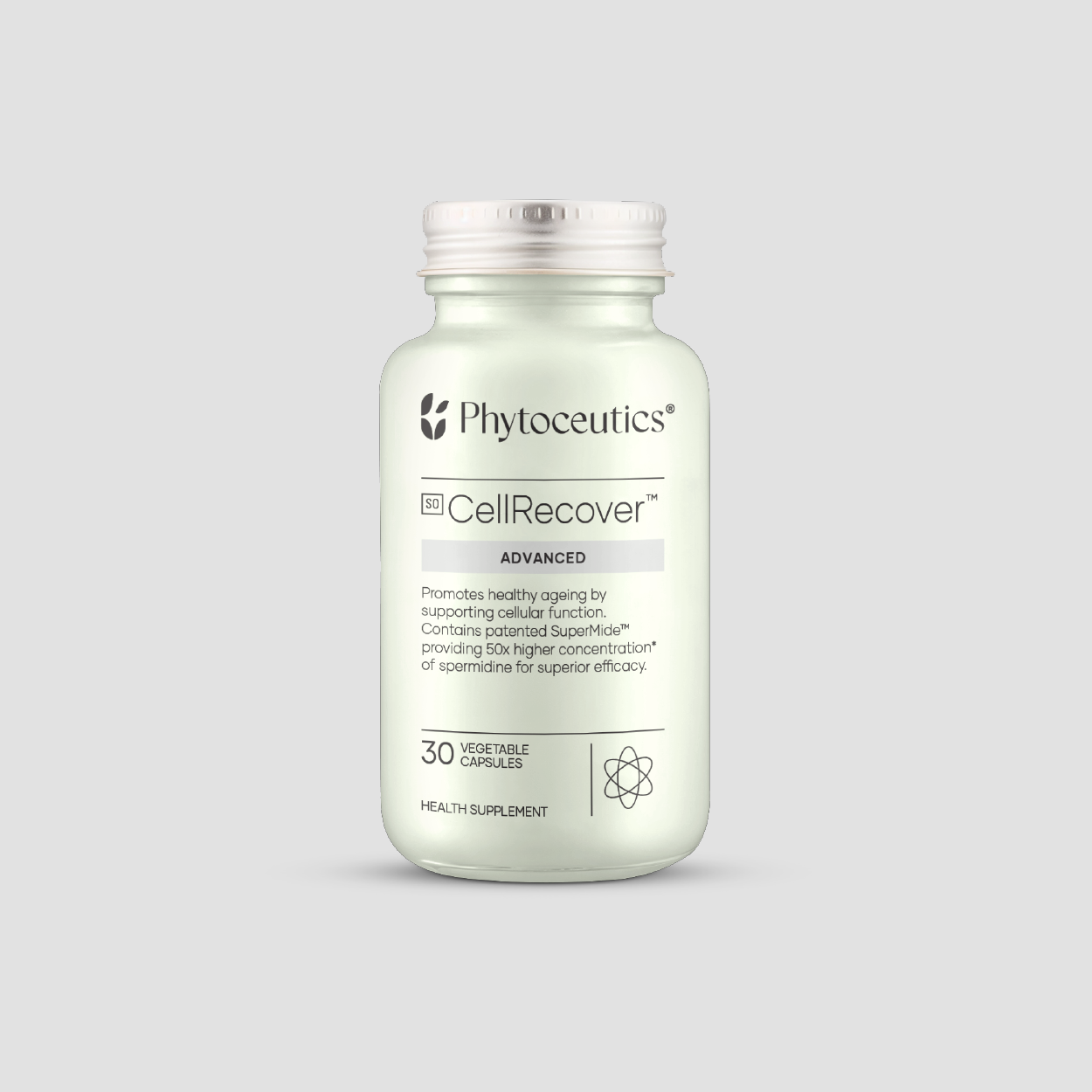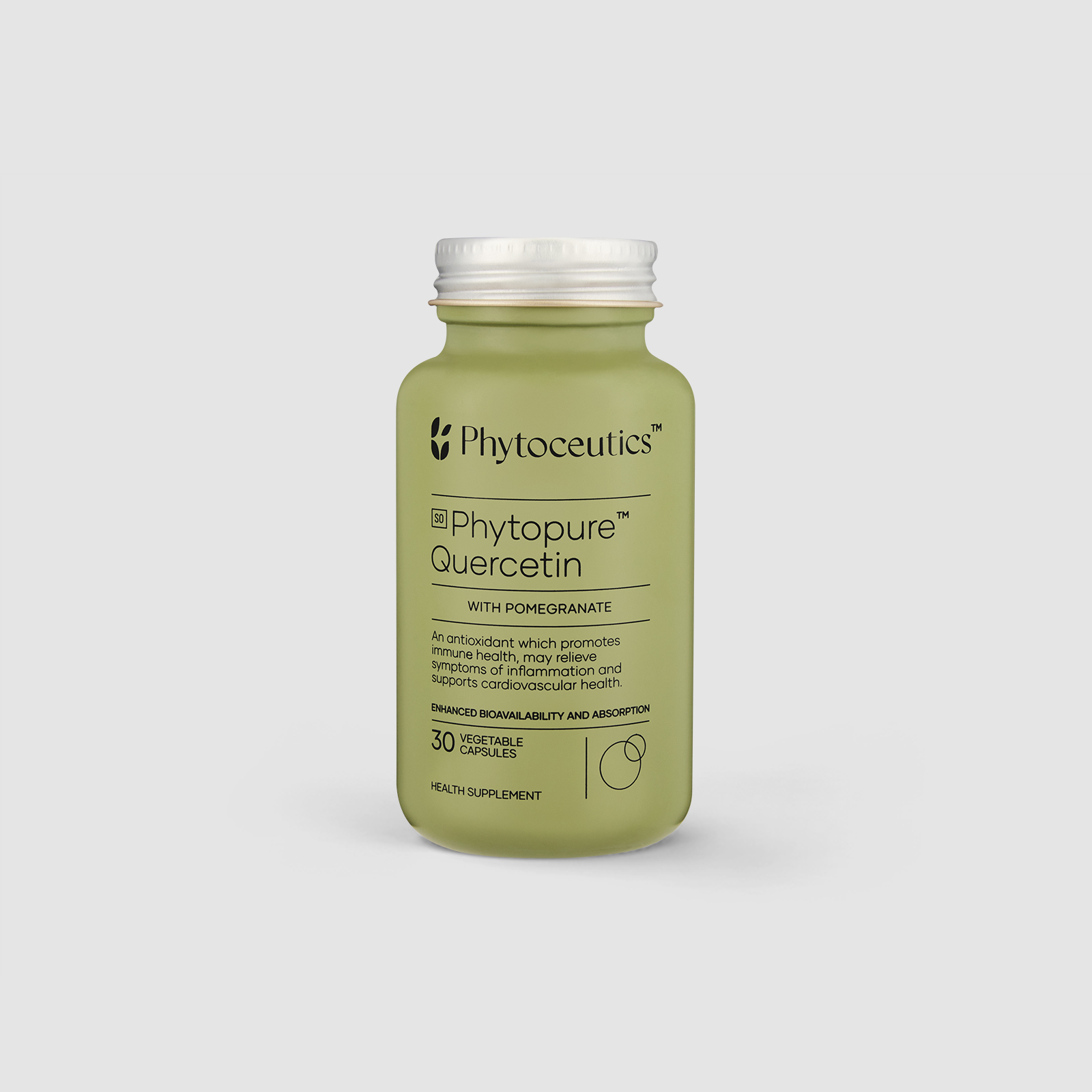One promising compound in this field is spermidine, a naturally occurring compound that plays a crucial role in cellular function and healthy ageing. Recent research suggests that spermidine supplementation can enhance autophagy, promote cardiovascular health, and potentially protect against neurodegenerative diseases [9].
What is Spermidine?
Spermidine is a polyamine, a type of organic compound with two or more amino groups, essential for cellular function and survival. It was first discovered in 1678 by Dutch scientist Anton Van Leeuwenhoek in a sample of human semen. Spermidine is synthesised in the body from its precursor, putrescine, and serves as a precursor for another important polyamine, spermine [1].
Spermidine is found abundantly in ribosomes and living tissues, supporting various cellular functions such as:
- Cell growth and proliferation
- Apoptosis (programmed cell death)
- Mitochondrial function and energy production
- Autophagy, the process of cellular self-cleaning
- Healthy tissue growth and function [1].
How Spermidine Supports Healthy Ageing
1. Spermidine and Healthy Ageing
A prospective community-based cohort study investigated the relationship between dietary spermidine intake and mortality in humans. The study included 829 participants aged 45–84, with assessments on their diets over 20 years using questionnaires reporting spermidine-rich food intake frequency.
During the follow-up period from 1995 to 2015, 341 deaths were recorded, resulting in only 488 participants left in the study. The findings showed a significant reduction in overall mortality rates as spermidine intake increased. The results remained consistent across subgroups and were validated in the SAPHIR Study. The mortality difference between the highest and lowest spermidine intake groups was comparable to a 5.7-year reduction in biological age. These findings support the role of spermidine-rich nutrition in promoting healthy ageing [2].
2. Spermidine and Autophagy
Autophagy is a crucial process for cellular maintenance, removing damaged components and recycling nutrients, potentially slowing ageing. Spermidine acts as an autophagy inducer by inhibiting EP300, an enzyme that suppresses autophagy [3][4].
Autophagy plays a role in many aspects of ageing, including:
- Removing damaged mitochondria to maintain energy efficiency
- Clearing misfolded proteins linked to neurodegenerative diseases
- Reducing oxidative stress and inflammation [4].
Other Benefits of Spermidine
Spermidine’s Role in Cardiovascular Health
Spermidine plays a crucial role in cardiovascular health through multiple biological pathways. As a polyamine, it supports essential cellular functions such as DNA stabilisation, RNA transcription, protein synthesis, and immune modulation. Spermidine may also help regulate blood sugar by improving insulin sensitivity, enhancing glucose uptake, and reducing oxidative stress, which is linked to insulin resistance. Additionally, spermidine may lower blood pressure by influencing ion channels in vascular smooth muscle cells, promoting vasodilation, and supporting endothelial function, which enhances nitric oxide production for better blood flow.
In terms of cholesterol regulation, spermidine might help lower LDL-C levels by improving lipid metabolism, increasing LDL receptor activity, and preventing LDL oxidation – a key factor in cardiovascular diseases. It may also boost HDL-C levels by promoting cholesterol transport and protecting HDL particles from oxidative damage [5].
Spermidine and Brain Health
Spermidine has been identified as a promising neuroprotective agent. It is found in high concentrations in the human brain and plays a role in neurotransmission, synaptic plasticity, and neuroinflammation regulation. Age-related neurodegeneration occurs due to the buildup of toxic debris, which can be cleared through autophagy.
Autophagy causes the breaking down and recycling of damaged cellular components, either as part of regular maintenance or in response to stress. This process, often described as cellular self-digestion, helps rejuvenate cells and remove intracellular pathogens. Present in all organisms at a basal level, autophagy is regulated by factors such as oxidative stress, starvation, and hypoxia (an absence of enough oxygen in the tissues to sustain bodily functions). By clearing aggregates of harmful proteins, autophagy supports neural health and preserves essential brain functions [6].
Does Spermidine Increase Testosterone Levels?
The prevalence of infertility and sexual dysfunction is rising in both men and women, with stress and hormonal imbalances playing a key role. Spermine and spermidine, polyamines found in plant foods and synthesised in mammals, are essential for reproductive health and stress regulation. An open-label pilot study evaluated the effects of spermine and spermidine supplementation on hormone levels over 30 days in 15 healthy individuals with no history of infertility or sexual dysfunction. Results showed a significant reduction in cortisol (stress hormone) levels in 83% of men and 37% of women after 30 days, with sustained effects in some participants post-supplementation.
Additionally, women experienced moderate increases in progesterone, and oestradiol, while men showed reductions. Testosterone levels increased in younger men, but declined in older participants, while women exhibited fluctuating testosterone levels over time. Notably, participants experienced an average weight loss of 3.3 pounds without dietary or metabolic intervention. These findings suggest that spermine and spermidine may promote hormonal balance and stress reduction, which are crucial for fertility and sexual function [8].
Dietary Sources of Spermidine
Spermidine is naturally found in various foods, particularly those common in the Mediterranean diet. Rich sources include:
- Fruits and Vegetables: Grapefruit, oranges, green peppers, broccoli, cauliflower, peas, and chickpeas
- Whole Grains and Legumes: Wheat germ, rice bran, corn, and soy products
- Fermented and Aged Foods: Mature cheeses, shiitake mushrooms, and amaranth grain
Since dietary spermidine levels decline with age, supplementation may be necessary to maintain optimal health benefits [1].
Spermidine Supplements: Are They Worth It?
Given the role of spermidine in ageing and disease prevention, many people consider taking it in supplement form. Spermidine supplements are derived from natural sources such as wheat germ extract and are chemically identical to the naturally occurring compound in foods.
Potential Benefits of Supplementation:
- Supports cellular renewal and repair
- Enhances autophagy
and healthy ageing
- Improves cardiovascular function
- Protects against neurodegenerative diseases
Try Phytoceutics® CellRecover™ Advanced – a cutting-edge health supplement designed to support cellular health through a powerful dual-action approach. It combines spermidine, which promotes autophagy—the body’s natural process of cellular recycling and renewal—with quercetin, a potent antioxidant that helps protect against oxidative stress and inflammation. By enhancing autophagy, spermidine supports the removal and renewal of damaged cells and cellular components, helping to maintain overall cellular function and resilience.
Meanwhile, quercetin provides strong antioxidant protection, neutralising free radicals to safeguard tissues from oxidative damage linked to age-related diseases. Together, these ingredients work to reduce inflammation associated with ageing, promoting healthier ageing, improved cellular repair, and enhanced immune function at a cellular level.
Can You Take Spermidine Every Day?
Research indicates that daily supplementation with spermidine is generally safe and well-tolerated. Spermidine has shown promising effects in animal studies and preliminary human studies, with no significant adverse effects, and participants maintaining stable vital signs, weight, and clinical parameters throughout the intervention [7].However, the optimal dosage can vary based on individual health needs, it’s always best to consult with a healthcare provider before starting any new supplement, especially for long-term daily use.
What Should You Avoid When Taking Spermidine?
There aren’t any specific food or substance interactions that are well-documented in research to avoid strictly. However, it’s always good practice to keep a few things in mind to optimise the effects of spermidine and avoid potential interactions.
- Stay hydrated: Spermidine supplements may increase the body’s demand for nutrients involved in autophagy and cellular repair, so maintaining good hydration and a balanced diet is beneficial.
- Balanced diet: A diet rich in natural spermidine (found in foods like wheat germ, soybeans, mushrooms, and aged cheese) might complement the supplement and further optimise its potential benefits.
- Avoid Excessive Alcohol Consumption: Alcohol can impair cellular function and disrupt autophagy (the process spermidine is thought to support). While moderate alcohol intake isn’t necessarily harmful when taking spermidine, heavy drinking may counteract some of the beneficial effects spermidine might have on cellular health [10].
Moderation is key with any supplement. While spermidine has shown promising health benefits in animal studies, very high or prolonged doses in humans haven’t been fully studied, so it’s essential to follow recommended doses and consult with a healthcare provider before starting regular supplementation.
Spermidine stands out as a powerful compound in the promotion of healthy ageing, backed by growing scientific evidence. Its ability to activate autophagy, protect against neurodegeneration, and support cardiovascular health makes it a critical factor in healthy ageing. Studies consistently link higher spermidine intake to reduced mortality rates and a lower risk of age-related diseases, reinforcing its role as a key component of cellular health.
Given its natural presence in certain foods and the promising benefits observed, spermidine supplementation or dietary inclusion may be an effective strategy for supporting healthy ageing and maintaining overall vitality. For those looking to optimise their healthspan, incorporating spermidine-rich foods or considering supplementation may be a step toward a healthier, longer life.
This unregistered medicine has not been evaluated by SAHPRA for its quality, safety, or intended use. Please always consult with your healthcare practitioner before starting a new supplement regimen.




